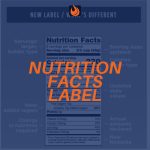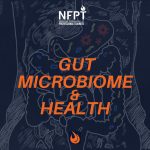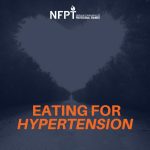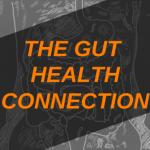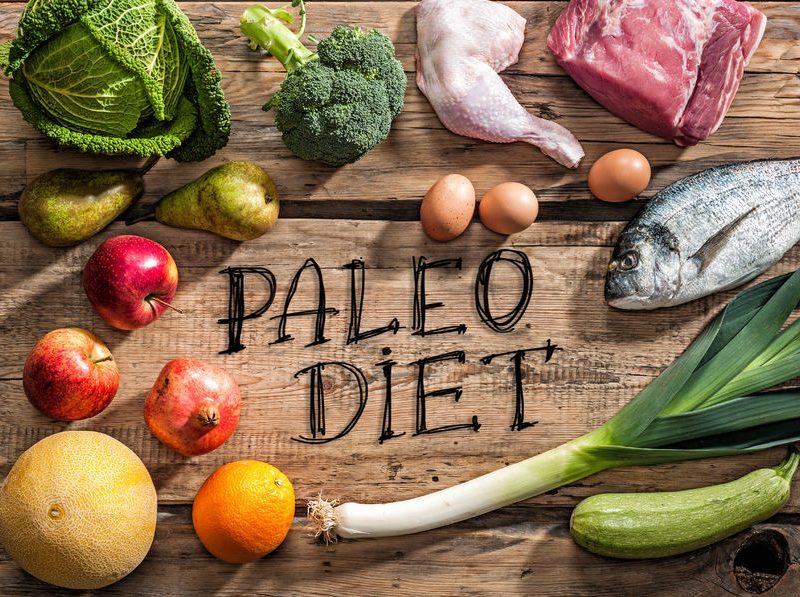
The Paleo Diet remains a popular weight loss diet for clients despite persistent misconceptions about this approach to nutrition. “Paleo” is short for “Paleolithic”, which is the era between 3.3 million years ago and approximately 11 thousand BC. This diet asserts that our ancestors were largely free of modern chronic diseases, and that our current dietary practices are at odds with our biology.
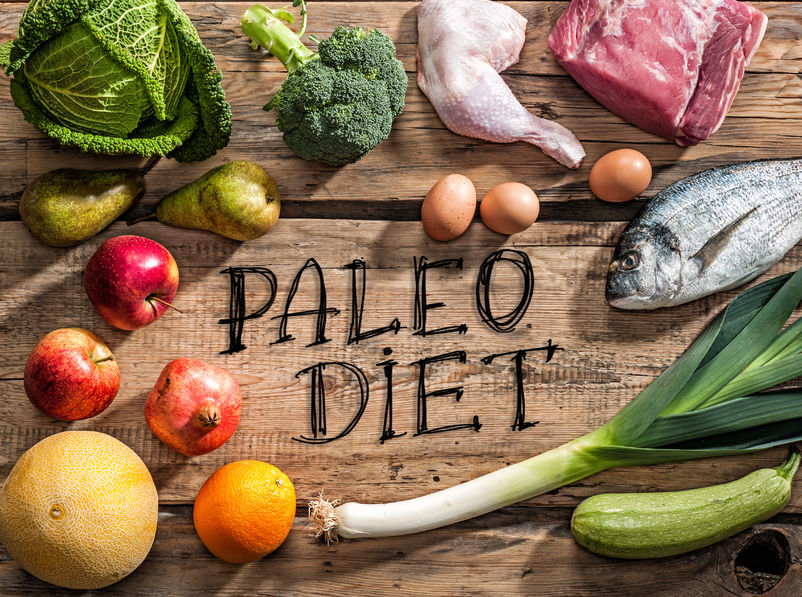
Paleo Diet 101
A general overview of the diet:
Excluded foods:
- Cereal grains (wheat, barley, rye, quinoa, rice, corn, oats)
- Vegetable Oils (canola, corn, soy, margarine, sunflower/safflower, peanut, hydrogenated oils)
- Dairy (Some variations allow full-fat, grass-fed dairy if tolerated)
- Legumes (Some variations may allow, depending on tolerance and if prepared a particular way)
Included foods:
- Beef, poultry, fish, pork, eggs, game meats, organ meats
- Vegetables (Starchy and non-starchy)
- Fruits
- Nuts
- Seeds
- Natural fats (includes tallow, lard, duck fat, olive oil, coconut oil, avocado oil)
The Four Most Common Paleo Myths
Myth: Eat Like a Caveman
The Paleo Diet is often referred to as the “Caveman Diet” because it eliminates grains, legumes, dairy, and vegetable oils, which are foods that became staples of the human diet after the advent of agriculture (15-10,000 BC). While this is a convenient way to explain the tenets of the Paleo diet, the cultural stereotypes of our hunter-gatherer ancestors tend to inform our perceptions.
The idea of a caveman diet conjures images of Fred Flintstone eating brontosaurus ribs. This illustration gives rise to other myths about the diet: that it’s always low-carb and meat-centric, that it is the definitive human diet, and that it’s only good for getting lean.
Reality: Evolution as a Guide for Human Nutrition
The Paleo Diet asserts that our genes are ill-suited to handle foods that are staples of modern agriculture: grains, legumes, dairy, and vegetable oils. Until the advent of agriculture, humans were nomadic hunters and gatherers, and these foods did not feature heavily in the 2 million years of human evolution prior. Although 10 -15 thousand years seems like a long time, in terms of evolution it is minuscule. Adaptation also requires an environmental pressure that favors a particular trait. Humans have not had the time, nor the selective pressure, for adaptations to grains, legumes, dairy, and vegetable oils to be widespread throughout our species.
Rather than eating like a caveman, think of the Paleo Diet as a template to determine whether or not your body is suited to these modern staples. An elimination diet can help determine whether or not an individual can tolerate foods that have not been a major part of the evolution of our species.
Myth: The Paleo Diet is Low-Carb and Meat-Centric
As mentioned above, the notion of eating like a caveman lends itself to eating chunks of meat off the bone. Grains, legumes, and (low fat) dairy are high in carbohydrates; eliminating these foods can reasonably lead someone to believe that Paleo is a carb-restricted diet.
While the Paleo Diet has a strong emphasis on responsibly sourcing high-quality animal protein (grass-fed beef, pasture-raised poultry, wild-caught fish), it does not lay out a specific macronutrient distribution that is ideal for all people.
Taken together, the elimination of high-carb staples and the prioritization of high-quality animal protein can lead to this belief, but the responsible Paleo advocate will advise an individual to utilize a macronutrient distribution that aligns with their goals.
Reality: The Paleo Diet is Macronutrient Agnostic
It is important to point out that there is currently no widely accepted definition of what constitutes a low-carb diet.
- The American Academy of Family Physicians defines a low-carbohydrate diet as one that restricts carbohydrates to less than 20% of total calories.
- The Obesity Medicine Association has three definitions of low carb: Strict (0g-20g/day), Moderate (20g-50g/day), and Liberal (50g-100g/day).
- In 2015, Dr. Richard Feinman, a professor of biochemistry and leading medical researcher of low-carb diets, proposed the following categories in an effort to standardize definitions:
-
- Very Low Carbohydrate diets (≤10% of calories from carbohydrate)
- Low Carbohydrate diets (10%-26% of calories from carbohydrate)
- Medium Carbohydrate diet (26%-46% of calories from carbohydrate)
- High Carbohydrate diet (>46% of calories from carbohydrate)
When an individual cuts out processed junk food, which is very high in carbohydrates, the result will be a diet that is LOWER in carbohydrate, but not necessarily one that would be considered low-carb.
Athletes can implement a high-carbohydrate Paleo Diet by incorporating sweet potatoes, white potatoes, yams, parsnips, squashes, and high-carb fruits like bananas, dates, pineapple, and mango. Someone who is obese or diabetic can easily limit their carbohydrate intake by eschewing these same vegetables and fruits, and emphasize leafy vegetables, berries, lean meats, nuts, and seeds. A ketogenic diet can also be accommodated by a Paleo diet by prioritizing fattier cuts of meat, avocados, coconut, and leafy greens. These variations in macronutrients all fit within the Paleo template.
Myth: There is Only One Version of the Paleo Diet
The Paleo Diet® was popularized by Dr. Loren Cordain, PhD., in his 2002 book The Paleo Diet. He advocated for the elimination of grains, legumes, dairy, potatoes, fatty meats, juices, starchy vegetables (even sweet potatoes), salt, vinegar, alcohol, and all sugars.
For many years, this version of the Paleo Diet reigned supreme: Eat like this and you will become a paragon of human health, claimed proponents of Cordain’s version of Paleo. However, this diet evolved into more inclusive versions of its original blueprint. There is tremendous variability and individuation regarding foods that can optimize human health.
Anyone who argues whether or not a particular food is “Paleo” misses the point entirely. It’s not about adhering to a particular set of rules, but rather using the rules to determine whether certain foods help or hinder your health goals.
Reality: The Paleo Diet is Highly Individualized
To say that our hunter-gatherer ancestors all ate the same diet would mean that all humans in all places had access to the same plants and animals, and that food options did not vary with the seasons. This is clearly an unlikely scenario. The two traditional societies that best illustrate how different a healthy human diet can be are the Inuit and Kitavans.
The traditional diet of the Inuit is vastly different from the traditional diet of the Kitavans. The traditional Inuit diet is comprised mostly of fat from the blubber of marine animals like whales, and is low in produce and fiber because of the harsh conditions of the Arctic.
The Kitavans, a people who live in the South Pacific, have a traditional diet comprised mostly of starchy carbohydrates (yams, sweet potatoes, taro), fruit, fish, and coconut. There isn’t much coconut in the Arctic, and seals don’t live in tropical climates. The macronutrient ratios and available flora and fauna differ greatly between these native peoples, yet their traditional diets allow them to remain healthy and largely free from diseases like diabetes or cardiovascular disease.
Geography, climate, and seasonality were the major factors in determining what foods were available to our ancestors, and as a species, we adapted to be able to survive and thrive on a variety of foods. However, genetics play a role in which foods are best suited to an individual, and it is up to each individual to determine which foods optimize their health and which do not.
Myth: Paleo is Only Good for Weight Loss
At the beginning of the Paleo fad, many people tried it because of weight loss success stories. The weight loss that many people experience can be explained by a calorie deficit implemented by removing grains, legumes, dairy, and vegetable oils. No bread, pasta, cereal, pastries, rice, beans, milk, ice cream, French fries or potato chips? No wonder people lose weight! However, this frame of mind regarding the diet disregards other benefits found by removing food that can be detrimental to one’s health.
Reality: Paleo Can Improve Health Outcomes
A recent study found that a Paleolithic diet, even without exercise, improved fat mass, glycemic control, insulin sensitivity, and leptin sensitivity in individuals with type II diabetes. Another study found that compared to the Mediterranean Diet – which is often advocated for heart health and longevity – a Paleo diet is superior in terms of satiety, fat loss (particularly central adiposity), and increased leptin sensitivity in individuals with coronary artery disease and type II diabetes.
In both studies, the participants were allowed to eat at will with no caloric restrictions. The individuals who ate a Paleo diet found themselves in caloric deficit by happenstance because of the satiating nature of whole foods, and hence, significantly improved health markers.
Beyond chronic diseases of lifestyle (diabetes, obesity, heart disease), a Paleo diet has the potential to impede or reverse other chronic degenerative diseases, such as multiple sclerosis (MS). Dr. Terry Wahls, MD, created a modified version of the Paleo diet, called the Wahls Protocol, to aid in her battle with MS. Her dietary intervention focuses on consuming foods rich in vitamins and minerals that are critical for brain function and mitochondrial function. She was her own test subject for this protocol, and she successfully reversed her MS symptoms. She is again able to walk on her own and no longer requires a wheelchair. Her protocol is currently undergoing clinical trials to explore the potential of this dietary intervention on other individuals with MS, and has so far shown improvements in mood, fatigue, and cognitive function.
The Takeaway
The philosophy behind the Paleo Diet suffers largely because of its name. It does not aim to recreate the diet of our ancestors as our farming and husbandry practices have selectively bred certain characteristics into the plants and animals we consume that would render them unrecognizable to our ancient relatives.
It does not have a certain macronutrient distribution like a ketogenic diet or the Zone diet, although it is possible to fit either into the confines of a Paleo diet. It has enormous potential to improve health outcomes related to chronic disease, and is an excellent starting place for an individual to determine a dietary approach that best suits their lifestyle and goals.
As trainers, it is outside of our scope of practice to assign specific diets for our clients, but it is important to understand the diets our clients are interested in. We should have a breadth of knowledge on these subjects, and we should ensure that our knowledge is accurate so that we can relay the best information to those individuals who trust us with their health.
References:
- Bisht, B., Darling, W. G., White, E. C., White, K. A., Shivapour, E. T., Zimmerman, M. B., & Wahls, T. L. (2017, June 26). Effects of a multimodal intervention on gait and balance of subjects with progressive multiple sclerosis: A prospective longitudinal pilot study. Retrieved from https://www.ncbi.nlm.nih.gov/pubmed/30050380
- Dietary carbohydrate restriction as the first approach in diabetes management: Critical review and evidence base. (2014, July 16). Retrieved from https://www.sciencedirect.com/science/article/pii/S0899900714003323?via=ihub
- Jönsson, T., Granfeldt, Y., Erlanson-Albertsson, C., Ahrén, B., & Lindeberg, S. (2010, November 30). A paleolithic diet is more satiating per calorie than a mediterranean-like diet in individuals with ischemic heart disease. Retrieved from https://www.ncbi.nlm.nih.gov/pmc/articles/PMC3009971/
- Kubal, A. (2016, October 06). Is It Paleo? And Does It Really Matter? Retrieved from https://robbwolf.com/2016/10/06/is-it-paleo-and-does-it-really-matter/
- Last, A. R., & Wilson, S. F. (2006, June 01). Low-Carbohydrate Diets. Retrieved from https://www.aafp.org/afp/2006/0601/p1942.html
- Lee, J. E., Bisht, B., Hall, M. J., Rubenstein, L. M., Louison, R., Klein, D. T., & Wahls, T. L. (2017). A Multimodal, Nonpharmacologic Intervention Improves Mood and Cognitive Function in People with Multiple Sclerosis. Retrieved from https://www.ncbi.nlm.nih.gov/pubmed/28394724
- Lindeberg, S., Ahrén, B., Nilsson, A., Cordain, L., Nilsson-Ehle, P., & Vessby, B. (2003). Determinants of serum triglycerides and high-density lipoprotein cholesterol in traditional Trobriand Islanders: The Kitava Study. Retrieved from https://www.ncbi.nlm.nih.gov/pubmed/12817903
- Otten, J., Stomby, A., Waling, M., Isaksson, A., Tellström, A., Lundin-Olsson, L., . . . Olsson, T. (2017, January). Benefits of a Paleolithic diet with and without supervised exercise on fat mass, insulin sensitivity, and glycemic control: A randomized controlled trial in individuals with type 2 diabetes. Retrieved from https://www.ncbi.nlm.nih.gov/pmc/articles/PMC5402870/
- Tuttle, R. H. (2019, January 08). Human evolution. Retrieved from https://www.britannica.com/science/human-evolution
- What Is a Low-carb Diet? (2017, July 31). Retrieved from https://obesitymedicine.org/low-carb-diet/

